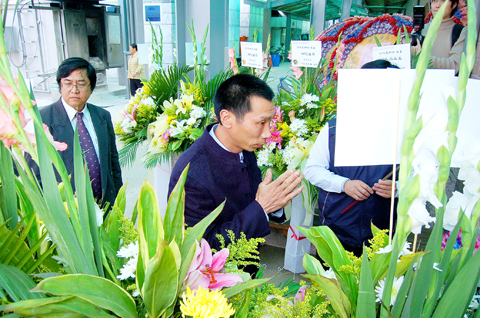A Chinese delegation arrived in Taiwan late on Sunday to help deal with an incident in which two visiting monks from China’s Linggu Temple died at a Hsinchu hotel last week.
The delegation was headed by Li Huaining (李淮寧), a Nanjing City Government department chief in charge of ethnic and religious affairs.
Members of the mission included relatives of the two deceased monks and Dharma Master Longxiang, head of the Nanjing Buddhist Association.

PHOTO: HUANG MEI-CHU, TAIPEI TIMES
Li said after his arrival at Taiwan Taoyuan International Airport that his group expected to get first-hand information about the incident.
He was referring to a suspected homicide-suicide case last Wednesday in which Dharma Master Jing Ran (淨然), abbot of Linggu Temple, was believed to have been killed by Dharma Master Chun Ru (純如), supervisor at the same temple, who later committed suicide.
The two deceased monks were part of a six-member group invited by the Hsuan Chuang Culture and Education Foundation, an affiliate of the private Hsuan Chuang University in Hsinchu City, to visit Taiwan on a goodwill tour.
The six-member delegation of four dharma masters and two Buddhist followers from the famous Nanjing Buddhist temple, arrived in Taiwan last Monday for a six-day visit.
Police said it appeared that Chun hit Jing on the head with a lampstand during a heated argument the day before their bodies were found.
Shocked that Jing had died from the blow, Chun appeared to have jumped to his death from the rooftop of the Hsinchu hotel where all the delegation members were staying, police said.
Meanwhile, the chief executive of the Hsuan Chuang foundation said on Sunday that postmortems were to be conducted yesterday.
If all goes smoothly, he said, a funeral would be held today and the monks’ bodies could be cremated and the ashes taken back to China by family members.
The group is scheduled to return to China tomorrow, he said.

Alain Robert, known as the "French Spider-Man," praised Alex Honnold as exceptionally well-prepared after the US climber completed a free solo ascent of Taipei 101 yesterday. Robert said Honnold's ascent of the 508m-tall skyscraper in just more than one-and-a-half hours without using safety ropes or equipment was a remarkable achievement. "This is my life," he said in an interview conducted in French, adding that he liked the feeling of being "on the edge of danger." The 63-year-old Frenchman climbed Taipei 101 using ropes in December 2004, taking about four hours to reach the top. On a one-to-10 scale of difficulty, Robert said Taipei 101

Taiwanese and US defense groups are collaborating to introduce deployable, semi-autonomous manufacturing systems for drones and components in a boost to the nation’s supply chain resilience. Taiwan’s G-Tech Optroelectronics Corp subsidiary GTOC and the US’ Aerkomm Inc on Friday announced an agreement with fellow US-based Firestorm Lab to adopt the latter’s xCell, a technology featuring 3D printers fitted in 6.1m container units. The systems enable aerial platforms and parts to be produced in high volumes from dispersed nodes capable of rapid redeployment, to minimize the risk of enemy strikes and to meet field requirements, they said. Firestorm chief technology officer Ian Muceus said

MORE FALL: An investigation into one of Xi’s key cronies, part of a broader ‘anti-corruption’ drive, indicates that he might have a deep distrust in the military, an expert said China’s latest military purge underscores systemic risks in its shift from collective leadership to sole rule under Chinese President Xi Jinping (習近平), and could disrupt its chain of command and military capabilities, a national security official said yesterday. If decisionmaking within the Chinese Communist Party has become “irrational” under one-man rule, the Taiwan Strait and the regional situation must be approached with extreme caution, given unforeseen risks, they added. The anonymous official made the remarks as China’s Central Military Commission Vice Chairman Zhang Youxia (張又俠) and Joint Staff Department Chief of Staff Liu Zhenli (劉振立) were reportedly being investigated for suspected “serious

American climber Alex Honnold is to attempt a free climb of Taipei 101 today at 9am, with traffic closures around the skyscraper. To accommodate the climb attempt and filming, the Taipei Department of Transportation said traffic controls would be enforced around the Taipei 101 area. If weather conditions delay the climb, the restrictions would be pushed back to tomorrow. Traffic controls would be in place today from 7am to 11am around the Taipei 101 area, the department said. Songzhi Road would be fully closed in both directions between Songlian Road and Xinyi Road Sec 5, it said, adding that bidirectional traffic controls would